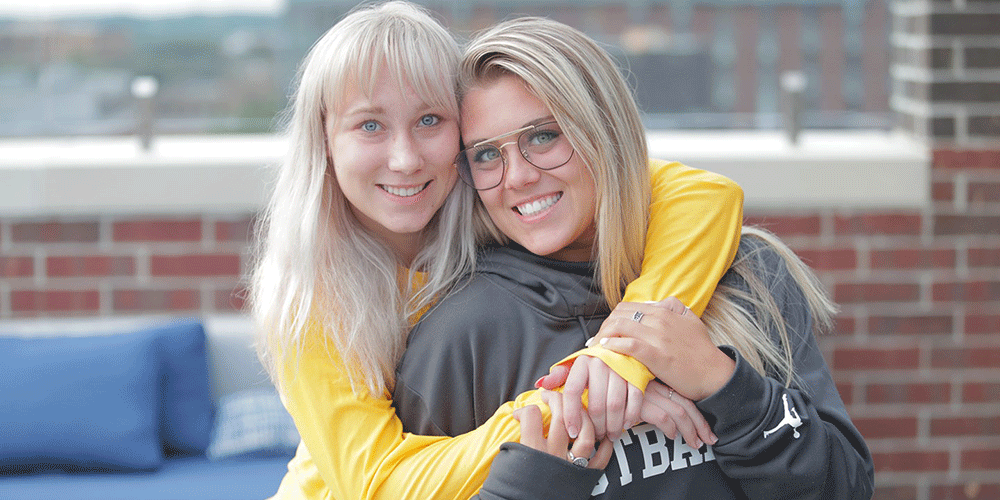Gymnasts interrupted
College gymnasts spend nearly their entire lives participating in the sport they love, and the ending can be difficult to cope with. When the end comes to sooner than expected, it can be even harder to accept.
That is what happened to Michigan seniors Sam Roy and Polina Shchennikova in 2018.
Both gymnasts were coming off a second straight Big Ten championship season and were ready to contribute again in 2019. However, for different reasons, both gymnasts would see their collegiate careers come to a close before their junior season could get underway.
Shchennikova was seeing doctors about back pain when she was told that continuing in gymnastics would be too much of a health risk.
“I refused to believe it for the longest time,” Shchennikova says. “When they first told me I was unable to do gymnastics any more I immediately went into a dark hole and refused to talk to anybody. I didn’t believe it was true.”For Roy, it wasn’t an injury but a culmination of issues outside the gym that was affecting her in a negative way.
“My mental health wasn’t in a good place,” she says. “I wasn’t recognizing it because I was focused on my goals in the gym. I was very quiet about that stuff. When it came time to step away, my initial reaction was anger. I felt like I had failed myself.”
After both made the decision to retire from gymnastics, head coach Bev Plocki offered them an opportunity to become student assistant coaches.
“Any time you end up having to give up the sport you love it is difficult emotionally,” says Plocki. “I wanted them to still feel like they were a part of the team.”
The team, the team, the team

Shchennikova and Roy found their way as student assistant coaches. And champions! (Image: mgoblue.com)
Even though the two were continuing to be a part of the program, the first several months were extremely difficult.
They still wanted to be training in the gym but were trying to learn how to be a coach instead. It still hurt, it was still hard to accept, and it was a daily reminder of what was taken away from them.
Both needed to find ways to move on. Roy found that asking for help was where it all started, and meeting with the Athletic Counseling team was helpful. Shchennikova found that shifting her focus to helping others was the biggest help, as it gave her a purpose outside of gymnastics.
It was the team and the coaches that made the biggest difference in the healing.
“The coaches have supported us through everything we have done,” says Shchennikova. “They understood it wasn’t an easy transition, but they made us feel welcome and comfortable in our new roles. I am also very grateful for the entire team which stayed with me the entire time, it means the world to me.”
Through last season and this past fall, the two have grown to love their new roles. Roy assists associate head coach Scott Sherman with coaching uneven bars, and Shchennikova helps out with choreography and balance beam.“They are both very different,” says senior Maggie O’Hara. “Po definitely has an eye for gymnastics and notices the little things. Sam knows how to get you pumped up and is our hype woman over there. Po has a calming effect and has breathing exercises or quotes to make us laugh when we get worked up. It is cool they both chose to stay in gymnastics. It speaks a lot to their character that they would stay.”
Winning
Roy and Shchennikova helped Michigan capture another Big Ten Championship in 2019, but the biggest accomplishment for them was taking their own mental health struggles and turning them around to become advocates for mental health in the community.
Roy and volleyball senior Sydney Wetterstrom started a group called S.A.S.H (Student-Athlete Sexual Health) a year ago. It is for anyone affected by sexual abuse, sexual harassment, or anyone affected by others who have experienced them.
“It’s a safe place where you can talk about your feelings and emotions whether good, bad or ugly,” says Roy. “That was really important.”
They also are mental health representatives for the Student-Athlete Advisory Committee (SAAC) and help promote mental health initiatives within the athletic department.
Shchennikova has spent the last year working on a project of her own called First Love Yourself (FLY) that is aimed at helping individuals who struggle with suicidal thoughts, eating disorders, depression, and anxiety.
“I know how hard it is to talk about mental health and open up about problems,” says Shchennikova. “I want to help others feel like they aren’t alone, help others out of the dark, and help end the stigma.”
It has been through remaining a part of the U-M gymnastics program that both Roy and Schennikova have been able to stay involved with the sport they love, while also accepting the support and encouragement from teammates and coaches to find ways in which they can help others overcome their obstacles.
“Both are tremendous young women with bright futures,” says Coach Plocki. “I am really happy they have been able to embrace their role as coaches and contribute tremendously to the team.”
Roy is a neuroscience major who plans to do an accelerated nursing program before going to medical school. Shchennikova is a sport management major and has found a love for coaching gymnastics. She is looking into graduate school and wants to become a gymnastics coach.
(This story is reprinted courtesy of mgoblue.com. Top image, left to right, Shchennikova and Roy, provided by mgoblue.com.)



